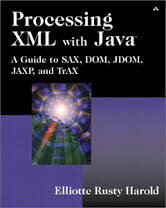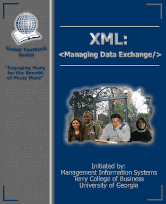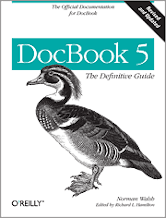Last Updated on December 25, 2024
XML is a set of rules for defining semantic tags that describe the structure and meaning of a document.
The user of XML chooses the names and placement of the tags to convey the nature of the data stored in a document. XML can be used to markup any data file to make it easier to understand and process.
In addition, it has been applied to many special domains of data: mathematics, music, vector graphics, the spoken word, financial data, chemical symbols, and web pages among others.
Here’s our recommended free books to master XML.
1. Processing XML with Java by Elliotte Rusty Harold
 Processing XML with Java is a complete tutorial about writing Java programs that read and write XML documents.
Processing XML with Java is a complete tutorial about writing Java programs that read and write XML documents.
It contains over 1.000 pages of detailed information on SAX, DOM, JDOM, JAXP, TrAX, XPath, XSLT, SOAP, and lots of other juicy acronyms.
This book is written for Java programmers who want to learn how to read and write XML documents from their code.
2. XML – Managing Data Exchange by Wikibooks
 This Wikibook provides a detailed description of XML, its origins, its programming, and its uses on the Internet today.
This Wikibook provides a detailed description of XML, its origins, its programming, and its uses on the Internet today.
This book also provides exercises with which to test the knowledge you have gained through the deliberate study of its contents.
Permission is granted to copy, distribute, and/or modify XML – Managing Data Exchange under the terms of the Creative Commons Attribution-ShareAlike 3.0 License.
3. DocBook: The Definitive Guide by Norman Walsh
 If you need a reliable tool for technical documentation, this clear and concise reference will help you take advantage of DocBook, the popular XML schema originally developed to document computer and hardware projects. DocBook 5.0 has been expanded and simplified to address documentation needs in other fields, and it’s quickly becoming the tool of choice for many content providers.
If you need a reliable tool for technical documentation, this clear and concise reference will help you take advantage of DocBook, the popular XML schema originally developed to document computer and hardware projects. DocBook 5.0 has been expanded and simplified to address documentation needs in other fields, and it’s quickly becoming the tool of choice for many content providers.
You’ll find everything you need to know to use DocBook 5.0’s features-including its improved content model-whether you’re new to DocBook or an experienced user of previous versions.
- Learn how to write DocBook XML documents.
- Understand DocBook 5.0’s elements and attributes, and how they fit together.
- Determine whether your documents conform to the DocBook schema.
- Learn about options for publishing DocBook to various output formats.
- Customize the DocBook schema to meet your needs.
- Get additional information about DocBook editing and processing.
Next page: Page 2 – PHP 5 Power Programming and more books
Pages in this article:
Page 1 – Processing XML with Java and more books
Page 2 – PHP 5 Power Programming and more books
Page 3 – Rapid Application Development with Mozilla and more books
All books in this series:
| Free Programming Books | |
|---|---|
| Ada | ALGOL-like programming language, extended from Pascal and other languages |
| Agda | Dependently typed functional language based on intuitionistic Type Theory |
| Arduino | Inexpensive, flexible, open source microcontroller platform |
| Assembly | As close to writing machine code without writing in pure hexadecimal |
| Awk | Versatile language designed for pattern scanning and processing language |
| Bash | Shell and command language; popular both as a shell and a scripting language |
| BASIC | Beginner’s All-purpose Symbolic Instruction Code |
| C | General-purpose, procedural, portable, high-level language |
| C++ | General-purpose, portable, free-form, multi-paradigm language |
| C# | Combines the power and flexibility of C++ with the simplicity of Visual Basic |
| Clojure | Dialect of the Lisp programming language |
| ClojureScript | Compiler for Clojure that targets JavaScript |
| COBOL | Common Business-Oriented Language |
| CoffeeScript | Transcompiles into JavaScript inspired by Ruby, Python and Haskell |
| Coq | Dependently typed language similar to Agda, Idris, F* and others |
| Crystal | General-purpose, concurrent, multi-paradigm, object-oriented language |
| CSS | CSS (Cascading Style Sheets) specifies a web page’s appearance |
| D | General-purpose systems programming language with a C-like syntax |
| Dart | Client-optimized language for fast apps on multiple platforms |
| Dylan | Multi-paradigm language supporting functional and object-oriented coding |
| ECMAScript | Best known as the language embedded in web browsers |
| Eiffel | Object-oriented language designed by Bertrand Meyer |
| Elixir | Relatively new functional language running on the Erlang virtual machine |
| Erlang | General-purpose, concurrent, declarative, functional language |
| F# | Uses functional, imperative, and object-oriented programming methods |
| Factor | Dynamic stack-based programming language |
| Forth | Imperative stack-based programming language |
| Fortran | The first high-level language, using the first compiler |
| Go | Compiled, statically typed programming language |
| Groovy | Powerful, optionally typed and dynamic language |
| Haskell | Standardized, general-purpose, polymorphically, statically typed language |
| HTML | HyperText Markup Language |
| Icon | Wide variety of features for processing and presenting symbolic data |
| J | Array programming language based primarily on APL |
| Java | General-purpose, concurrent, class-based, object-oriented, high-level language |
| JavaScript | Interpreted, prototype-based, scripting language |
| Julia | High-level, high-performance language for technical computing |
| Kotlin | More modern version of Java |
| LabVIEW | Designed to enable domain experts to build power systems quickly |
| LaTeX | Professional document preparation system and document markup language |
| Lisp | Unique features - excellent to study programming constructs |
| Logo | Dialect of Lisp that features interactivity, modularity, extensibility |
| Lua | Designed as an embeddable scripting language |
| Markdown | Plain text formatting syntax designed to be easy-to-read and easy-to-write |
| Objective-C | Object-oriented language that adds Smalltalk-style messaging to C |
| OCaml | The main implementation of the Caml language |
| Pascal | Imperative and procedural language designed in the late 1960s |
| Perl | High-level, general-purpose, interpreted, scripting, dynamic language |
| PHP | PHP has been at the helm of the web for many years |
| PostScript | Interpreted, stack-based and Turing complete language |
| Prolog | A general purpose, declarative, logic programming language |
| PureScript | Small strongly, statically typed language compiling to JavaScript |
| Python | General-purpose, structured, powerful language |
| QML | Hierarchical declarative language for user interface layout - JSON-like syntax |
| R | De facto standard among statisticians and data analysts |
| Racket | General-purpose, object-oriented, multi-paradigm, functional language |
| Raku | Member of the Perl family of programming languages |
| Ruby | General purpose, scripting, structured, flexible, fully object-oriented language |
| Rust | Ideal for systems, embedded, and other performance critical code |
| Scala | Modern, object-functional, multi-paradigm, Java-based language |
| Scheme | A general-purpose, functional language descended from Lisp and Algol |
| Scratch | Visual programming language designed for 8-16 year-old children |
| SQL | Access and manipulate data held in a relational database management system |
| Standard ML | General-purpose functional language characterized as "Lisp with types" |
| Swift | Powerful and intuitive general-purpose programming language |
| Tcl | Dynamic language based on concepts of Lisp, C, and Unix shells |
| TeX | Markup and programming language - create professional quality typeset text |
| TypeScript | Strict syntactical superset of JavaScript adding optional static typing |
| Vala | Object-oriented language, syntactically similar to C# |
| VHDL | Hardware description language used in electronic design automation |
| VimL | Powerful scripting language of the Vim editor |
| XML | Rules for defining semantic tags describing structure ad meaning |
